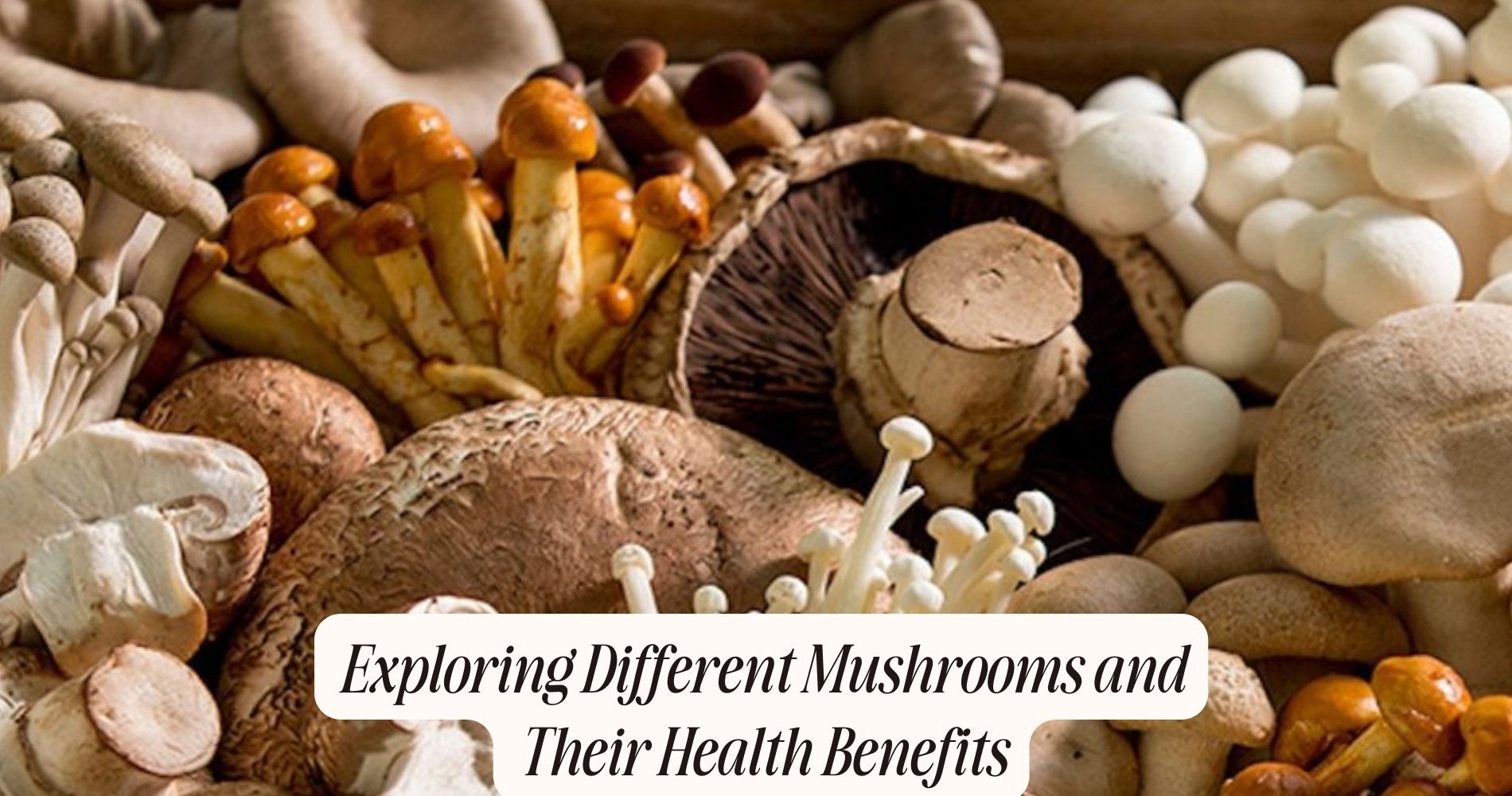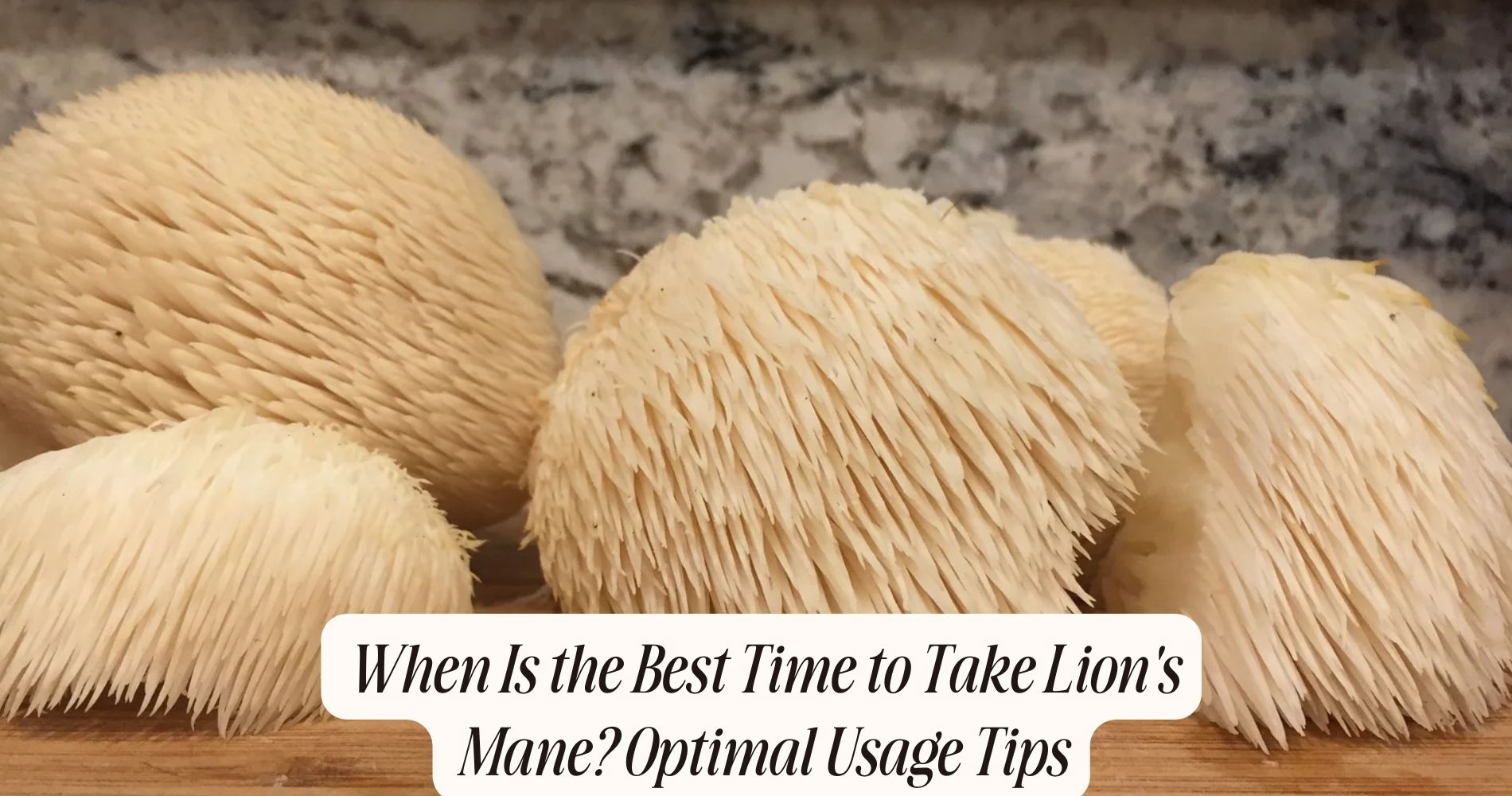
Exploring Different Mushrooms and Their Health Benefits
Explore the vast world of different mushrooms and their benefits for enhancing health. Button mushrooms excel as antioxidants, effectively combating oxidative stress and the proliferation of cancer cells. Shiitake mushrooms are abundant in lentinan and eritadenine, which bolster immunity and help lower cholesterol levels. Reishi mushrooms are known for their triterpenoids and polysaccharides, ingredients that help reduce inflammation and alleviate stress. Lion’s Mane mushrooms support cognitive function through the stimulation of NGF synthesis. Chaga mushrooms, loaded with beta-glucans and SOD, enhance immune function and fight oxidative stress.
Each variety of mushroom brings unique bioactive compounds, vitamins, and minerals that contribute to overall wellness. Dive deeper into the extraordinary benefits of these fungi and learn how to integrate them effectively into your diet.
Button Mushrooms
Button mushrooms, scientifically known as Agaricus bisporus, are among the most widely cultivated and consumed mushrooms globally. You'll find that these mushrooms aren't just popular for their mild flavor and culinary versatility; they also pack a punch when it comes to health benefits. One of the most notable aspects of button mushrooms is their rich antioxidant properties. These antioxidants, such as selenium and ergothioneine, play a critical role in neutralizing free radicals in your body. Free radicals can cause oxidative stress, which damages cells and can lead to chronic diseases, including cancer.

When you think about cancer prevention, button mushrooms should be on your radar. Research indicates that the bioactive compounds in these mushrooms, including polysaccharides and conjugated linoleic acid, exhibit potential anti-cancer effects. These compounds can inhibit the proliferation of cancer cells and induce apoptosis, or programmed cell death, in various cancer cell lines. Studies have shown that regular consumption of button mushrooms can lower the risk of several types of cancer, such as breast and prostate cancer.
Shiitake Mushrooms
While button mushrooms have their own impressive health credentials, shiitake mushrooms (Lentinula edodes) offer a unique set of benefits that make them a valuable addition to your diet. Renowned for their rich umami flavor, shiitake mushrooms are also celebrated for their significant health properties. They contain lentinan, a polysaccharide that has been shown to stimulate the immune system. This immune boost can help your body fend off infections and illnesses more effectively.
Moreover, shiitake mushrooms are a rich source of vitamins and minerals, including vitamin D, B vitamins, selenium, and zinc. These nutrients play important roles in various physiological processes, from bone health to energy metabolism. The presence of eritadenine, a compound found in shiitake mushrooms, can help lower cholesterol levels by inhibiting the absorption of cholesterol in the gut.

For a convenient way to incorporate these benefits into your daily routine, consider shiitake tea. This beverage utilizes dried shiitake mushrooms, allowing you to extract their bioactive compounds into a soothing drink. Regular consumption of shiitake tea can provide consistent immune support and contribute to overall well-being.
Adding shiitake mushrooms to your diet isn't just a culinary choice; it's a strategic move for better health.
Reishi Mushrooms
Renowned in traditional medicine for their potent health benefits, reishi mushrooms (Ganoderma lucidum) have been studied extensively for their anti-inflammatory and immune-modulating properties. You'll find that these fungi are rich in bioactive compounds such as triterpenoids, polysaccharides, and peptidoglycans, which contribute to their therapeutic effects.
When you consume reishi mushrooms, you're supporting your immune system in multiple ways. The polysaccharides in reishi stimulate macrophages and natural killer cells, enhancing your body's ability to fend off pathogens. Additionally, reishi's triterpenoids have been shown to suppress inflammatory cytokines, providing anti-inflammatory benefits.
Reishi mushrooms are also renowned for stress reduction. They contain compounds that influence the hypothalamic-pituitary-adrenal (HPA) axis, helping to regulate cortisol levels. By modulating this stress hormone, reishi can promote relaxation and improve sleep quality, which is essential for overall well-being.
Scientific studies have confirmed these effects, demonstrating that reishi can reduce fatigue and improve mood in individuals experiencing chronic stress.
Incorporating reishi into your routine could offer a dual benefit: bolstering immune support and aiding in stress reduction, making it a valuable addition to your health regimen.
Lion's Mane Mushrooms
Boasting neuroprotective properties, lion's mane mushrooms (Hericium erinaceus) have garnered attention for their ability to enhance cognitive function and promote nerve regeneration. These fascinating fungi contain bioactive compounds like hericenones and erinacines, which are crucial in stimulating nerve growth factor (NGF) synthesis. NGF plays a critical role in maintaining the health and function of neurons, making lion's mane a valuable ally in the quest for cognitive enhancement.

When you incorporate lion's mane into your diet, you're not just consuming a mushroom; you're investing in your brain health. Studies have demonstrated that this mushroom can improve memory, focus, and overall mental clarity. The neuroprotective properties of lion's mane are particularly promising for individuals at risk of neurodegenerative diseases such as Alzheimer's and Parkinson's. By reducing inflammation and oxidative stress, these mushrooms help safeguard your neurons from damage.
Moreover, lion's mane has shown potential in enhancing myelination, a process crucial for efficient nerve signal transmission. Whether taken as a supplement or enjoyed in culinary dishes, lion's mane offers a scientifically-backed approach to boosting your cognitive functions and protecting your nervous system.
Chaga Mushrooms
Chaga mushrooms (Inonotus obliquus), often found on birch trees, are renowned for their potent antioxidant properties and potential to support immune function. When you engage in wild harvesting, you'll notice Chaga's distinctive appearance: a dark, crusty exterior that contrasts sharply with the bright inner flesh. This parasitic fungus absorbs nutrients from its host tree, resulting in a dense concentration of bioactive compounds.
One of Chaga's primary health benefits is its role in immune support. Rich in beta-glucans, polysaccharides, and triterpenoids, Chaga can modulate your immune system, enhancing its response to pathogens. Additionally, the mushroom's high levels of superoxide dismutase (SOD) act as a powerful antioxidant, neutralizing free radicals and reducing oxidative stress in your body.
To maximize Chaga's benefits, you might consider incorporating it into your daily regimen through teas, tinctures, or supplements. However, wild harvesting requires careful identification to avoid misidentifying it with other tree fungi. Sustainable harvesting practices are essential to safeguard the longevity of Chaga populations and their ecosystems.
Maitake Mushrooms
Maitake mushrooms (Grifola frondosa), also known as 'hen of the woods,' are highly prized for their unique frond-like appearance and potent medicinal properties. These mushrooms boast bioactive compounds like beta-glucans, which play an important role in modulating the immune system. When you consume maitake mushrooms, these beta-glucans can stimulate macrophages and natural killer cells, enhancing your body's immune response and providing strong immune support.
Moreover, maitake mushrooms are noted for their beneficial effects on blood sugar regulation. The polysaccharides in maitake can improve insulin sensitivity and reduce blood glucose levels. Studies suggest that maitake extract can decrease insulin resistance, making it a valuable dietary addition for managing diabetes and metabolic syndrome.

In addition to their immunomodulatory and glycemic control properties, maitake mushrooms contain essential vitamins and minerals such as B-vitamins, potassium, and magnesium. These nutrients contribute to overall health and well-being. Consuming them regularly can support your body's natural defenses and help maintain stable blood sugar levels, thereby enhancing metabolic health.
Oyster Mushrooms
You'll find that oyster mushrooms, known scientifically as Pleurotus ostreatus, offer impressive nutritional benefits, including high protein content and essential amino acids.
Rich in antioxidants, they can enhance culinary dishes with their mild umami flavor and tender texture.
Whether sautéed, grilled, or incorporated into soups, oyster mushrooms provide both health advantages and versatile culinary applications.
Nutritional Value Highlights
Oyster mushrooms, rich in essential nutrients, offer a substantial source of protein, fiber, vitamins, and minerals that contribute to a balanced diet. These fungi are particularly notable for their impressive vitamin content. They're packed with B-vitamins such as niacin (B3), riboflavin (B2), and pantothenic acid (B5), which are vital for energy metabolism and maintaining healthy skin and nerves. Additionally, they provide a good amount of vitamin D, especially when exposed to sunlight, which supports bone health and immune function.
You'll also benefit from their high antioxidant levels. Oyster mushrooms contain compounds such as ergothioneine and glutathione, which help protect your cells from oxidative stress. These antioxidants play a significant role in reducing inflammation and may lower the risk of chronic diseases like heart disease and cancer.
From a mineral standpoint, oyster mushrooms are rich in potassium, iron, and zinc. Potassium helps regulate fluid balance and muscle contractions, while iron is essential for oxygen transport in the blood. Zinc supports immune function and wound healing.
Integrating oyster mushrooms into your meals can notably enhance your nutrient intake, promoting overall health and well-being.
Culinary Uses Explained
When it comes to culinary applications, these versatile fungi can be sautéed, grilled, roasted, or incorporated into soups and stews to enhance flavor and texture.
Oyster mushrooms (Pleurotus ostreatus) are particularly prized for their delicate yet robust taste, which can elevate a variety of dishes. Their texture, often described as meaty, makes them a popular substitute for meat in vegetarian and vegan recipes.
If you're into mushroom foraging, you might've already encountered these wild mushrooms clinging to the sides of decaying logs or trees. Once harvested, you can clean them gently with a damp cloth to remove any debris. Avoid soaking them in water as they're highly absorbent and can become waterlogged.
When sautéing, a quick toss in a hot pan with olive oil, garlic, and herbs can bring out their natural umami flavors. For grilling or roasting, a light brushing of oil and seasoning is sufficient to create a crispy exterior while maintaining a tender interior. In soups and stews, their fibrous structure holds up well, adding both substance and a nuanced flavor profile.
Boost Your Health with Well Gummies' 10-IN-1 Mushroom Blend
As you delve into the myriad health benefits of different mushrooms, enhance your wellness journey with our SUPER MUSHROOM GUMMIES from Well Gummies. These convenient gummies combine ten potent mushroom varieties, including those you've just read about, in one easy-to-consume form. Our vegan formula provides a blend of functional mushrooms that offer calmer energy, sharper focus, and strong immune support, helping maintain a balanced body and a clear mind. Enjoy the delicious taste of fresh wild berries—making your health routine as enjoyable as indulging in your favorite candy, without any jitters or crashes. Perfect for daily use, Well Gummies make it simple and tasty to fuel your brain and energize your body naturally.
Frequently Asked Questions
Are There Any Potential Side Effects of Consuming Wild Mushrooms?
Yes, consuming wild mushrooms can pose risks. Toxic varieties can cause severe poisoning, while others may induce allergic reactions. Always verify accurate identification and consult experts to minimize potential health hazards associated with wild fungi consumption.
How Can I Safely Forage for Wild Mushrooms?
To safely forage for wild mushrooms, use proper foraging tools and reliable identification guides. Study detailed observations on spore prints, cap shapes, and gill structures. Never consume unidentified mushrooms; many have toxic look-alikes.
What Are the Nutritional Differences Between Fresh and Dried Mushrooms?
Fresh mushrooms retain more water-soluble nutrients, while dried mushrooms have a higher concentration of minerals and vitamins. You'll notice dried mushrooms offer intensified flavor concentration, but nutrient retention varies depending on the drying process.
Can Mushrooms Be Used as a Meat Substitute in Vegetarian Diets?
Yes, you can use mushrooms as a meat substitute in vegetarian diets. Their texture mimics meat, and their umami flavor adds depth. Varieties like portobello and shiitake offer substantial mouthfeel and essential nutrients.
How Should Mushrooms Be Stored to Maintain Freshness and Potency?
To maintain mushroom freshness and potency, use appropriate storage methods. Store them in a paper bag at a recommended temperature of 34-38°F. This prevents moisture buildup and prolongs their shelf life, ensuring quality and nutrient retention.
Conclusion
You've now explored a diverse range of mushrooms and their unique health benefits. From button mushrooms' essential nutrients to shiitake's immune-boosting properties, each type offers distinct advantages.
Reishi mushrooms support longevity, while Lion's Mane enhances cognitive function. Chaga boosts antioxidants, and Maitake assists in blood sugar regulation. Finally, oyster mushrooms provide cardiovascular benefits.
Incorporating these fungi into your diet can greatly elevate your overall well-being, making them a valuable addition to your nutritional regimen.




